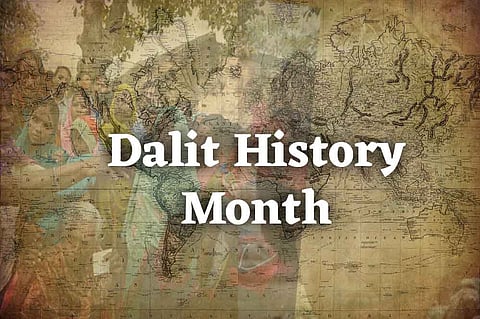
New Delhi- India's constitutional commitment to equality fails to prevent ongoing caste-based discrimination against Dalits. Legal frameworks evolved while numerous individuals maintain unchanged beliefs. The recent incident involving Shivam Sonkar—a Dalit scholar who achieved second place in his PhD, the Banaras Hindu University entrance exam exposes the harsh reality that caste continues to control access to opportunities.
This article examines the persistent discrimination against Dalits alongside their democratic struggle, the necessity of reservations, and Dr. Ambedkar’s enduring influence.
India continues to struggle with caste-based exclusion even after seventy-five years of independence. Legal frameworks prohibit untouchability, yet real-world conditions contradict this narrative. Members of the Dalit community face exclusion in society.
Take Shivam Sonkar’s situation: Despite being top-ranked, he was rejected from BHU’s Ph.D. program. The reason? His Dalit identity. These incidents reveal the operation of caste bias within prestigious institutions.
Reports indicate that Dalits still encounter discriminatory practices across educational institutions, professional environments, and social interactions. Members of lower castes remain trapped in demeaning employment while facing violent assaults for temple entry and brutal attacks for pursuing dreams beyond their caste restrictions.
"Democracy is meaningless unless it stands for the recognition of the dignity of every individual."
Every Indian citizen theoretically enjoys fundamental rights under the Constitution, but Dalits frequently remain excluded from these legal protections. The democratic system, designed to uplift marginalised groups, instead betrays their interests.
Dalits encounter political exclusion along with systemic violence and social rejection despite their constitutional rights. Requests for dignity by these individuals result in responses of threats, humiliation, and potential fatal outcomes. Indian society has deeply entrenched caste structures that obstruct the achievement of genuine equality.
Why does this discrimination persist? Because casteism is not just a system; it is a mindset. Laws can change, but attitudes take generations to evolve. Until society indeed acknowledges its biases, Dalits will remain second-class citizens in their own country.
A common question posed by critics is why Dalits continue to require reservations. What reasons exist for prioritising caste-based quotas over merit?
The straightforward explanation is that caste discrimination remains prevalent. Merit loses its significance when systemic barriers prevent access to opportunities. Historically, Dalits faced systemic exclusion from educational opportunities, job markets, and economic advancement. The purpose of reservations is to create equality by adjusting a historically skewed playing field, rather than providing them with undeserved benefits.
Absent reservation systems, dominant caste groups would maintain control over institutions, resulting in total exclusion of Dalits. Dalits encounter numerous barriers, including discrimination and isolation, along with inadequate institutional support despite existing reservation policies. The situation of Shivam Sonkar demonstrates that Dalits remain vulnerable to caste discrimination despite their achievements.
"Turn in any direction you like, caste is the monster that crosses your path."
Think for a moment about an India without Dr B.R. Ambedkar. Would democracy, socio-economic justice, and constitutional rights exist authentically?
Dr. Ambedkar was born into a Dalit family and faced humiliation at various points in his life. Yet, he emerged as the chief architect of India's constitutional framework, which empowered all people, regardless of caste, to have equal rights. Ambedkar's vision was not merely about laws; it was about dignity. He worked for women’s rights, labor rights, and the annihilation of caste.
Ambedkar contributed to modern India's development, but many who use these rights today fail to appreciate that they became entitlements through a Dalit leader. It is ironic that those opposed to reservations and Dalit rights conveniently overlook the fact that the Constitution was written by a Dalit.
"The progress of any society can be measured by the position of its weakest members."
The matter of casteism concerns more than Dalits—it is a matter of humanity. Until India is prepared to identify people as 'people' and not castes, there can be no genuine democracy.
According to political scientist Dr. Hanumanthappa D.G., Ambedkar's philosophy was based on the universal human rights of all people. The principles of liberty, equality, and fraternity should be the foundations of India today.
The question becomes: are we really ready to live these principles? Are we, as a society, really ready to forego caste prejudice and elevate the human dignity of all people? It is time for India to choose. Shall we continue to subjugate a portion of our own people? Or shall we finally be ready to rise above caste and adhere to the humanity that joins us all?
The untouchable truth is that caste discrimination is far from finished. However, it is not simply the burden of Dalits alone to fight it; it is a fight for any Indian who believes in an idea of equality and justice.
History will judge us by how we treat the most marginalised. The choice is clear: either we uphold the Constitution and Ambedkar's vision of India, or remain bequeathed to a past of oppression.
Will India break the caste system? Or will we continue to let down our own? The answer rests in whatever we decide to do next.
- Poornima is a passionate academic with an M.A. in Political Science from the University of Lucknow and UGC NET-qualified Assistant Professor.
You can also join our WhatsApp group to get premium and selected news of The Mooknayak on WhatsApp. Click here to join the WhatsApp group.